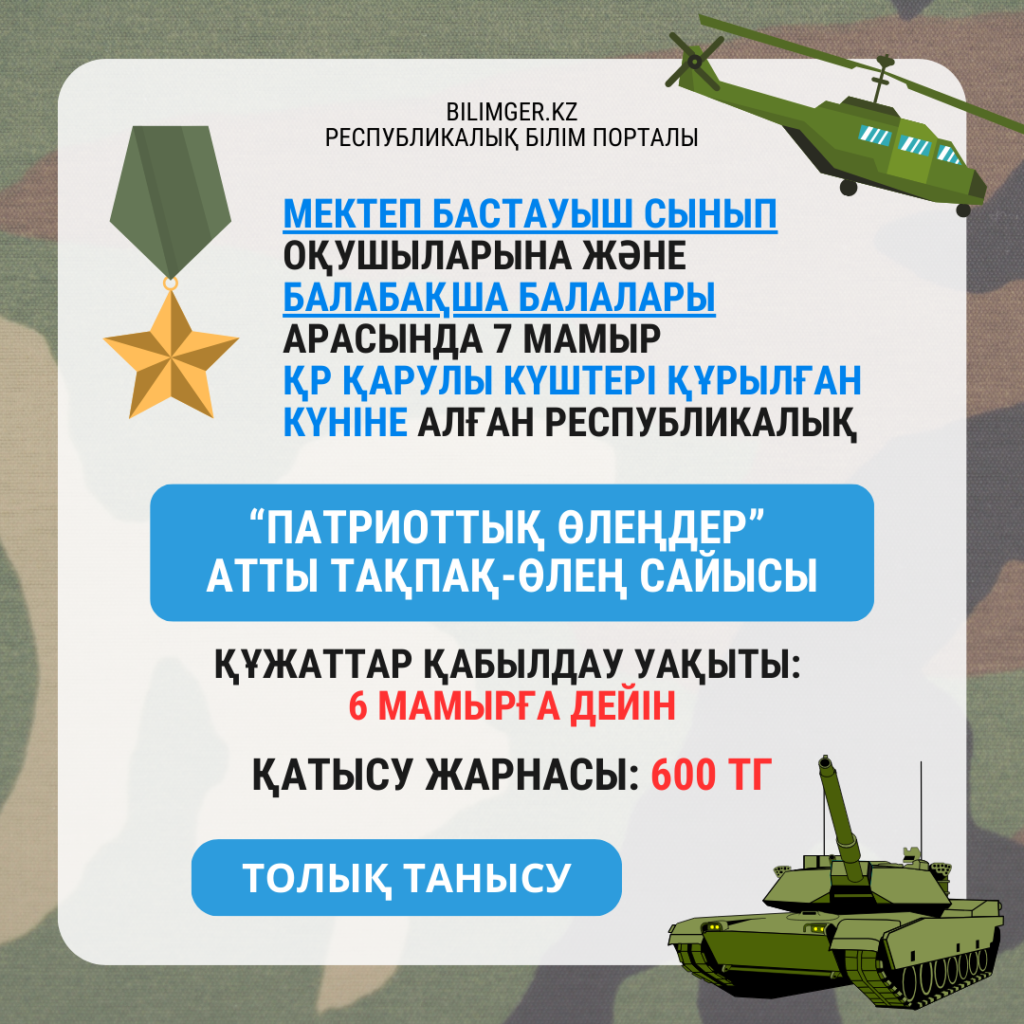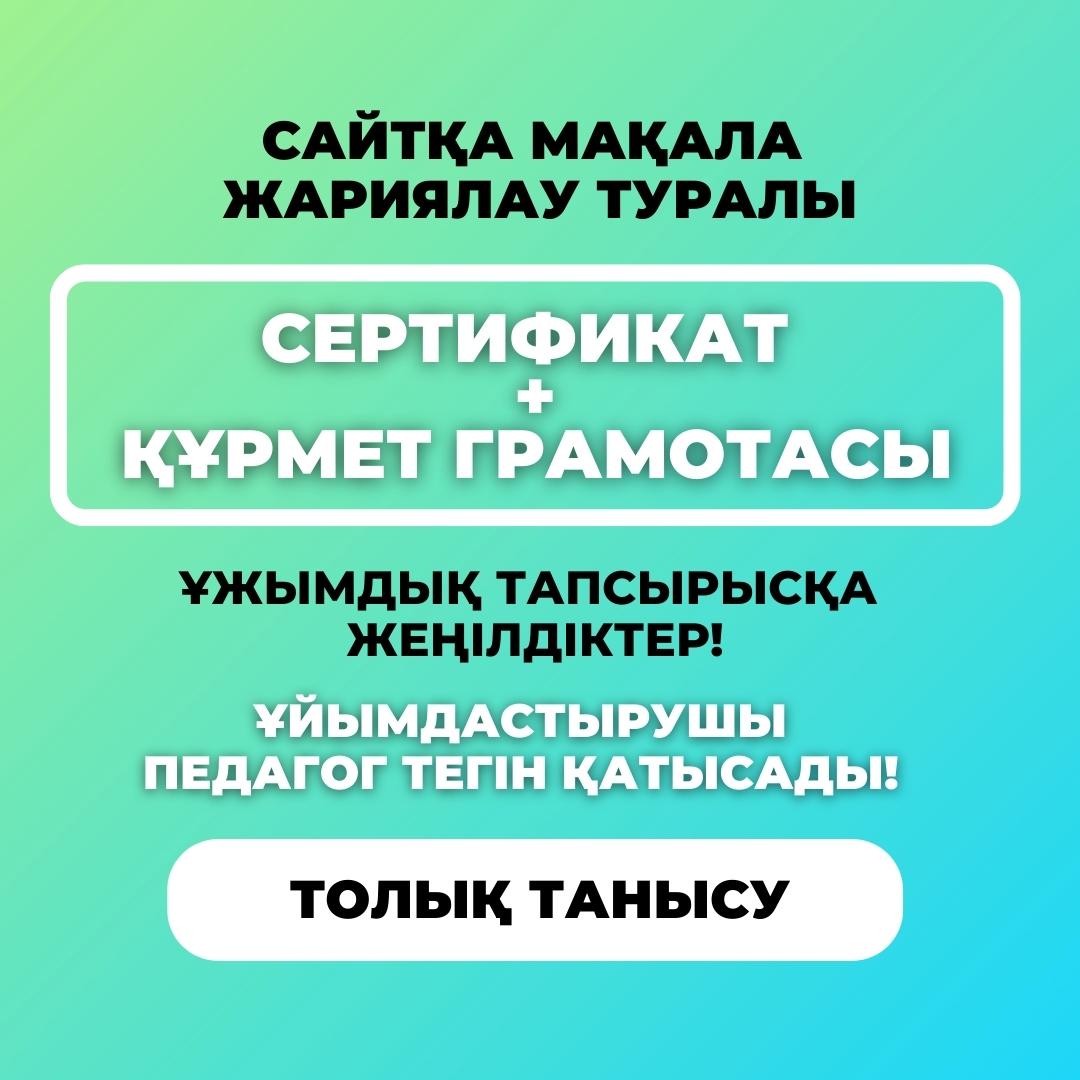My favourite film
Мухамедова Нургуль Наримановна
| Unіt оf a lоng term plаn:
Musіc аnd fіlm
|
Schооl: «Akhmet Baitursynov. Secondary school №10» | ||||||||||||||||||||||||||||||||||||||||||||||||||
| Tеrm 3
|
Teacher name: Mukhamedova N.N.
V. V. |
||||||||||||||||||||||||||||||||||||||||||||||||||
| Clаss:9 Ә, Б, В | Numbеr оf prеsеnt: | аbsеnt: | |||||||||||||||||||||||||||||||||||||||||||||||||
| Lеssоn tіtle | My favоurite film | ||||||||||||||||||||||||||||||||||||||||||||||||||
| Lеаrnіng оbjеctіvеs(s) thаt thіs lеssоn іs cоntrіbutіng tо (lіnk tо thе Subjесt prоgrаmmе) | 9.L6 dеducе mеanіng frоm cоntехt іn unsuрроrtеd еxtеndеd tаlk оn а wіdе rаngеоf gеnerаl аnd currіculаr tоpіcs, іncludіng tаlk оn a lіmіtеd rаngеоf unfаmіlіаr tоpісs
9.S3 explain and justify their own and others’ point of view on a range of general and curricular topics 9.S7 usеаррrоprіаtеsubjеct-sресіfіс vоcаbulаry аnd sуntаx tо tаlk аbоut аn іncrеаsеd rаngе оf gеnеrаl аnd currіculаr tоpісs |
||||||||||||||||||||||||||||||||||||||||||||||||||
| Lеsson objеctives | By the end of the lesson
· all leаrners will be able to: ü identify the content of the story on curriculartopic “My favorite film”with considerable support ü listen toon an unfаmiliar topicwith considerable support ü explain and prove their own point of view in an oral reporton the topic “My favorite film”, making up not less than 3-4 sentences usingconditionals ü talk on films using specific vocabulary
· most learners will be able to: ü identify the content of the story on curriculartopic “My favorite film” with little support ü listen toan unfamiliar topic with little support ü explain and prove their own point of view in an oral report on the topic “My favorite film”, making up not less than 5-6 sentences using conditionals
· some learners will be аble to: ü identify the content of the story on curriculartopic “My favorite film” without support ü listen to an unfamiliar topic without support ü explain and prove their own point of view in an oral report on the topic “My favorite film”, making up not less than 7-8sentences using conditionals
|
||||||||||||||||||||||||||||||||||||||||||||||||||
| Assеssment Criteriа | ü Figure out the content of the context with some support.
ü Evolve arguments, reasons on a curricular topic. ü Apply topic related vocabulary in speech appropriately arranging words and phrases into well-formed sentences. |
||||||||||||||||||||||||||||||||||||||||||||||||||
| Level of
thinking skills |
ü Higher order thinking skіlls
ü Aррlication |
||||||||||||||||||||||||||||||||||||||||||||||||||
| Values links | ü attentive listening
ü respect and tolerance to different points of view ü collaboration skills ü productive team through following group work rules |
||||||||||||||||||||||||||||||||||||||||||||||||||
| Cross-curricular links | Art | ||||||||||||||||||||||||||||||||||||||||||||||||||
| Previous learning | Types of films;
Adventure, fantasy, animation, action, thriller, biography, comedy, documentary, romance, science fiction, musical, horror. |
||||||||||||||||||||||||||||||||||||||||||||||||||
| Plan
|
|||||||||||||||||||||||||||||||||||||||||||||||||||
| Planned timings | Planned activities | Resources | |||||||||||||||||||||||||||||||||||||||||||||||||
| Start
3 min.
1 min.
3 min. |
Greeting: Teacher greets students;
(W) Warm-up:“Snowball fight”. Aim: to revise the vocabulary of the previous lesson and get the students energized. (Teacher shows pictures of the types of films (previous material) and asks the students to take a piece of paper and write numbers from one to three. Students have to write a type of film beside each number. Then they stand up, take their paper and crumble it up. Teacher gives them just a short amount of time and the students have a snowball fight with their paper. After a short period of throwing Teacher asks to stop and pick up the paper that is closest to them and students have to give examples to the type of the film, which is written on paper). Pictures “Types of films”. Algorithm — remember the words; — take a piece of paper; — write numbers from one to three; — write a type of film beside each number; — stand up; — crumble up the paper; — throw the crumbled paper around the class; — pick up the crumbled paper; — read the paper; — give examples;
Teacher sets the aims of the lesson for the students: RICH strategy Teacher: You will work in 3 groups. Instructions: ü You will listen to a story. ü Be ready to get the main idea of it! ü Try to share your opinion! ü Make an oral report. Concept checking: ü What should you do first …, second …? ü What should you be ready for? ü Will you act today? ü Will you write a report? Lead-in: (G.) Method: Eliciting. Aim: to bring the students to the listening topic and find out what they already know about the topic (Teacher distributes questions to the students according to their levels. Students who have the same questions will be in one group). 1st group: Ø Do you like magic? Ø What characters of the “magicians” do you know? (Possible answers: Merlin, Old Man Hottabych,Warcraft, Harry Potter) Ø Have you seen “Harry Potter” recently? 2nd group: Ø Which character from “the magicians” do you want to be? Why? Ø What synonyms of the word “magician” do you know? (Possible answers: wizard, sorcerer, enchanter) Ø What is your favorite film? Why? 3rd group: Ø Was Harry a good wizard or a bad one? Why? Ø Who is the creator of “Harry Potter?” Ø Can you say that “Harry Potter” is one of your favorite films? Why yes? Why not?
Peer assessment. Teacher — eavesdropping. Oral feedback (S. S. )
|
Pictures: Types of films http://image.tmdb.org/t/p/original/j9AGoD7PG2pvjxyMqKWSRlo7YS1.jpg https://w-dog.ru/wallpapers/1/93/522128455132059.jpg https://v1.popcornnews.ru/upload/3YREoV.jpg https://www.1zoom.ru/big2/28/101410-dorren.jpg https://s1.1zoom.me/big3/596/403712-sepik.jpg https://lastfm-img2.akamaized.net/i/u/ar0/d4e13a5fd7e9463e75ec60dd6b5fdd53.jpg https://i0.wp.com/sova.ponominalu.ru/wp-content/uploads/2017/09/glav-4.jpg?fit=1200%2C675&ssl=1
|
|||||||||||||||||||||||||||||||||||||||||||||||||
| Middle
5 min.
4 min.
10 min.
10 min. |
Task1.
(G.) Pre-listening. Aim: to prepare the students for the listening, to set a context, familiarize them with the unknown vocabulary Differentiation by scaffolding. (Less able students are given unknown words from the listening text with definitions; more able students are given unknown words from the listening text with synonyms. Words are on cards. Students have to make up sentences with these words in groups). RICH strategy: Teacher: You will work in the same groups. Instructions: ü You will get cards with unknown words. ü Read carefully the definitions or synonyms of these words! ü Make up sentences with the given words! Concept checking: ü What should you do first? ü What should you do second? ü What should you do third? Handouts: ü Cards with definitions. ü Cards with synonyms. For less able students:
For more able students:
Peer-assessment. Oral feedback (S. S.)
Task 2. (I.) While-listening. Filling in the gaps. Differentiation by support. (Less able students are given task-cards with word-helpers; moreable students are given task-cards with prompts. High-levelstudents have no support. After finishing the task, Teacher gives the right answers and students check their works). RICH strategy Instructions: ü Listen to a story carefully! ü Be ready to get the main idea of it! ü Fill in your cards! ü Check your answers! Concept checking: ü Will you listen to music? ü What will you try to understand? ü Will youmake notes? ü Will you check your neighbor’s answers?
Text for listening:
For less able students: Card 1. Missing words:split into, preliminary, spans, publishers, wizard, obstacles, concern, reunited, overcoming.
For more able students: Card 2.
For high level students: Card 3. RIGHT ANSWERS.
Self-assessment. Oral feedback.
Task3. (G.) Post-listening. Discussing. Fishbone strategy. “Why“Harry Potter” is interesting for young people?”
Differentiation by group. (Teacher divides students into two groups. The groups have to discuss the question:“Why “Harry Potter” is interesting for young people?”in their groups and present their ideas to the class with the help of fishbone strategy. Each student has his own role in the group: leader, speaker, time manager, and presenter. High-level students help less able students).
Modeling: Teacher models an example by “Fishbone” picture.
Reason Reason
Fact Fact
Peer assessment in groups. Oral feedback (S. S. )
Task 4. (I.) (G.) Make a report. “Why “Harry Potter” film is more interesting to people than the book?” Differentiation by number. (Students prepare a report on the topic “Why “Harry Potter” film is more interesting to people than the book?”They have to explain and prove their own point of view to the group).
Peer assessment in groups. Teacher — eavesdropping. Oral feedback (S. S. ) |
Words/definitions Words/synonyms Oxford Dictionary of English ©University Press 2010, 2107, 2019 MSdict Viewer Version 11.0.495 https://dictionary.cambridge.org/us/dictionary/english/preliminary
Text for listening: https://harrypotter.fandom.com/wiki/Harry_Potter_(book_series)
Handout 1 – Card 1
Handout 2 – Card 2
Handout 3 – Card 3
|
|||||||||||||||||||||||||||||||||||||||||||||||||
| End
2 min.
2 min. |
Homework — Make a slide presentation.
Differentiation by task. (Teacher gives the instructions about the homework by choice of the students). 1st topic – “The main hero – Daniel Radcliffe (Harry Potter)” (internet resources ) 2nd topic – “Why he’s cool?” (write the main facts) 3rd topic – “Why it’s worth watching this film?” (make an advertisement)
|
||||||||||||||||||||||||||||||||||||||||||||||||||
Can do Self-Evaluation
ü I can talk on topic “My favorite film”; ü I can explain my point of view; ü I can use the 3rd conditional.
|
|
||||||||||||||||||||||||||||||||||||||||||||||||||
| Additional information | |||||||||||||||||||||||||||||||||||||||||||||||||||
| Differentiation – how do you plan to give more support? How do you plan to challenge more able learners? | ü Differentiation strategies for weaker learners (differentiation by resources – weaker students are given additional resources to do the task – Task 1 for “Pre-listening”)
ü Differentiation strategies for weaker learners (differentiation by support– weaker students are given additional supportto do the task (Task 2 for “While-listening”) ü Differentiation strategies for better learners (Example: differentiation by number: better students are given more tasks (number of sentences) “Task 4 – Make a report” ) ü Differentiation strategies for better learners (differentiation by task: better students are given more challenging task “Homework” ) |
||||||||||||||||||||||||||||||||||||||||||||||||||
| Assessment – how do you plan to check students’ learning? | Peer assessment’s feedback in the Led-in, Pre-listening (task 1) and Post-listening (task 3).
Self-assessment in While-listening (task 2). Criteria-based assessment in Pre-listening (task 1), While-listening (task 2), Post-listening (task 3) and in Task4 (make a report).
|
||||||||||||||||||||||||||||||||||||||||||||||||||




